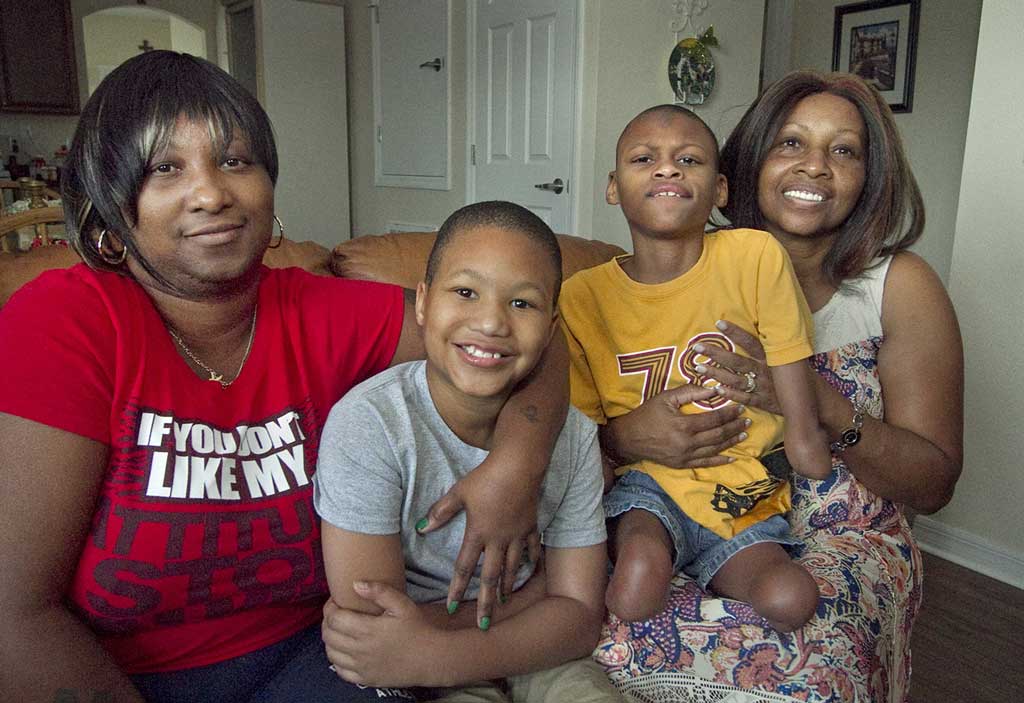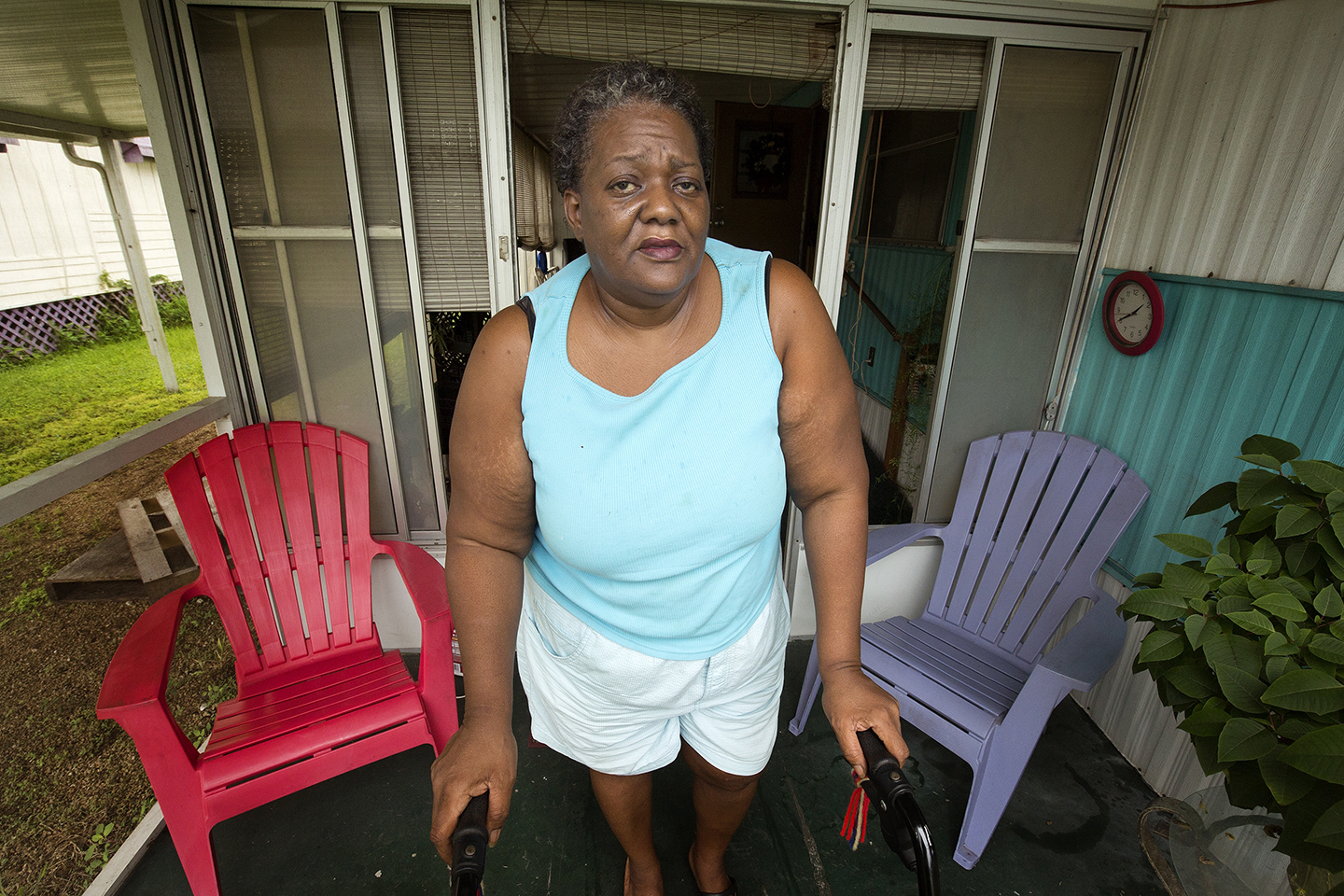
Cost of housing keeps rising; but wages don’t
By Rick Rousos / The Ledger
LAKELAND – Last year, a single mom and her two kids — one of them severely disabled – were living in a cramped, moldy U.S. 98 South apartment.
That’s when Amea Mitchell, 40, moved with her sons Jaylen, 11, and Joshua, 8, into a beautiful home off Reynolds Road in Lakeland. It has at least twice the space of their old apartment.
With the help of the nonprofit organizations Keystone Challenge Fund and Habitat for Humanity, Mitchell was able to buy her home.
Jaylen was born a healthy baby. But an invasive hospital staph infection left him with half arms and half legs. Most damaging of all, the infection spread to his brain.
He requires constant care.
Mitchell does her best with Jaylen, but his mood swings are quick and unremitting. In the span of just a minute, Jaylen can go from elated to crying to elated and back to crying and screeching. He can’t speak. And he spits up a lot.
The home is immaculately clean.
Jeff Bagwell, Keystone’s executive director, had a ramp installed that allows Jaylen to be wheeled into the house.
“This home opens up a whole new world for Jaylen,” said Estella Reeves, Mitchell’s mother. She is the strong matriarch of the family and helps Mitchell care for Jaylen. “This isn’t a place, it’s a home.”
Extra: Housing a problem for the working poor
Credit is Everything
Keystone is celebrating its 25th anniversary in Polk County. In those years, the nonprofit has helped 3,800 low-income families buy homes.
Low-income people trying to buy a home face income limits that are listed on charts on Keystone’s website, www.keystonechallenge.org.The phone number for the organization is 863-682-1025.
Not everyone can qualify, Bagwell said, and if someone can’t qualify for a house “we want to make them good renters.”
The most common but usually fixable obstacle to financing a low-income home through a bank is credit problems, Bagwell said. He said fixing credit troubles is Job One for most low-income home buyers.
In Mitchell’s case, she had to clear up some old medical bills to qualify to buy her home. Her only income is $139 per month in food stamps and $1,415 in disability income, mostly for Jaylen. Mitchell can’t work because Jaylen is a full-time job.
Mitchell said she paid about $3,500 as a down payment on her house and Keystone paid the closing costs. Her mortgage is $400 per month.
Keystone doesn’t charge potential homeowners for its services, but a lot is required of potential low-income home buyers. That includes taking a series of classes on how to thrive within the constraints of a budget and how to buy a home.
“What we’re looking for is stick-to-itiveness,” Bagwell said.
Mitchell has shown the persistence and discipline it takes to buy and own a home.
“I thank God for our new home,” Mitchell said. “We’re grateful and very appreciative for everything everyone did to help us.”
Low end of housing market
Polk County has its share of low-income households and properties assessed by taxing authorities at below $50,000, which is where many poor families reside.
According to U.S. Census figures from 2013, 13.7 percent of households in Polk County are under the poverty level. In Florida, that number is 11.9 percent.
For families with children younger than 18, the percent below the poverty level is 23.4 percent in Polk and 19.3 percent statewide.
Of more than 168,000 single-family properties in Polk, not including mobile homes, 8,933 have an assessed value of less than $25,000. Another 30,727 are assessed at between $25,000 and $50,000.
Properties assessed the lowest produce the lowest prices for renters.
According to Census figures, Polk County has more than 60,000 homes or apartments for rent. There are 1,144 that rent for $200 to $299 per month, 4,147 from $300 to $499 and 14,696 from $500 to $749.
Gordon Kettle, an economics professor at Polk State College, said it’s tough for many in Polk County. He said the poverty rate is higher here than the rate for Florida, and Florida’s is higher than most states.
Kettle said housing for the poor in Polk County is like many commodities: The cost keeps going up while wages remain stagnant.
Many of Polk’s poor people inhabit mobile homes. There are beautiful mobile home communities in the county but also loads of run-down mobile home communities.
There are 70,749 mobile homes in the county, according the Polk Property Appraiser, and families living in 31,012 of those homes do not own the land.
Enid Walker, 58, from Lakeland is one of Lakeland’s mobile home dwellers who struggle to get by.
Walker’s income is $150 per month in food stamps and $744 per month in disability payments. She is severely diabetic and has degenerative arthritis that gives her acute back pain.
Extra: What the “Three Sister” leaned from Talbot House
She is in a dispute with her park landlord over ownership of her Chapman’s Mobile Home Park home. Walker says she was supposed to get a title to the home after paying her first three months of lot rent in a deal she says she made with the owner. She has lived in the home for more than a year.
The lot rent is now $345 per month, and Walker fears that rent will soon rise.
She walks with the aid of a walker. The walk from her home to a New Tampa Highway bus stop that would take most people a minute takes her 10.
Walker has no cable TV.
“I don’t do and can’t do anything extravagant,” she said.

With such a limited income, Walker has to be frugal at the grocery store. She said she eats a lot of meals with hamburger meat, including spaghetti.
She doesn’t cook meals. She cooks pots of food that last three or four days because it’s cheaper.
“I have no car and no savings,” she said. “I just don’t have money.”
Rick Rousos can be reached at rick.rousos@theledger.com or 863-401-6970.